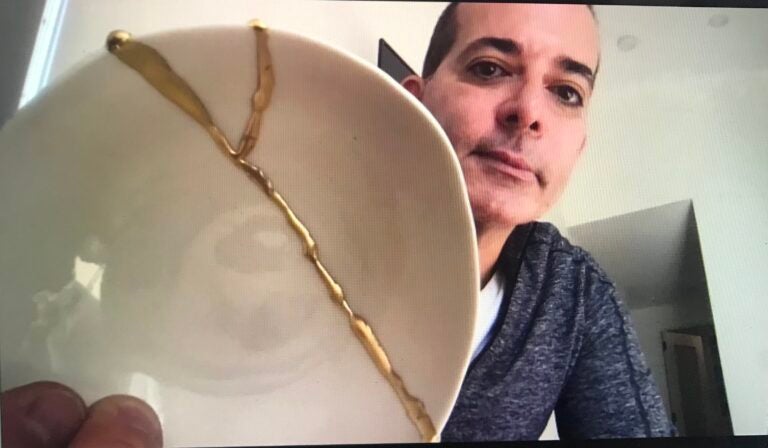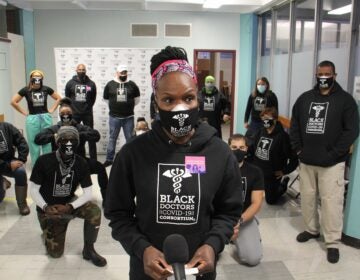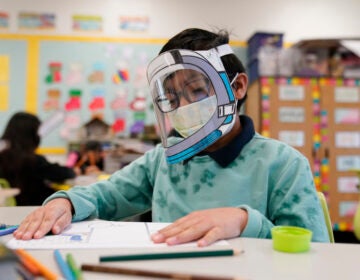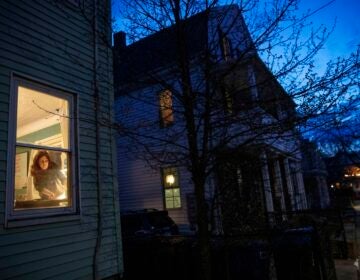Penn surgeon-turned-patient on surviving a stroke while hospitalized with COVID-19
"Morning Edition" host Jennifer Lynn speaks with Penn surgeon Dr. Matthew Beshara, who suffered a stroke while he was hospitalized with COVID-19.
Listen 4:37
Penn surgeon Dr. Matthew Beshara suffered a stroke while hospitalized with COVID-19 complications. (Courtesy of Jennifer Lynn)
Ask us about COVID-19: What questions do you have about the current surge?
Dr. Matthew Beshara is a local physician who was one of the first 10,000 people in the country to have contracted the coronavirus.
He had been a PennMedicine surgeon doing minimally invasive procedures at the time he came down with the virus in March. He was intubated, placed on a ventilator, and spent more than 50 days in an intensive care unit.
WHYY’s “Morning Edition” host Jennifer Lynn discovered his story of “doctor-turned-patient” on Penn’s Listening Lab website, where patients and health care workers share their stories of care and being cared for.
She spoke with Dr. Beshara last month. He’s in the throes of physical and cognitive therapy, and trying to make out what happened to him while he was hospitalized with COVID-19.
___
I’m trying to piece together that month of my life. My sister, when I woke up, said to me, you know, “Do you want to see the family, Mom and Dad, and everybody else on Zoom?” And I said, “No, I just saw them all in Italy.” And my sister said, “What are you talking about? We have never been to Italy. You’ve been in the intensive care unit for over a month.” Clearly, I was having very vivid dreams. That seemed like reality.
Yeah. You said you were in intensive care for more than 50 days. You had a stroke.
Yes, I had suffered a stroke. Once I woke up, I was like a shell of myself. I couldn’t add, I couldn’t subtract, I couldn’t tell time. It had injured my visual cortex. And so I knew I would have some sort of visual loss, which I do. I have a left visual field cut.
What is the left visual field cut?
When you look out, you see sort of a big oval. I only see my right oval. I’m missing the entire left portion of my field.
You also lost some sensation in your left side, is that correct?
Yes. So I have left arm weakness. I can’t feel my left fingers yet. My left leg is starting to come back a little bit, and so I can walk. I’m back on my Peloton and doing my physical exercise. I see a cognitive therapist one day a week to help me regain my time management, my executive function, my ability to tell time, logic, visual scanning.
Well, you said in your audio postcard that when you were a patient these alarm bells went off for you. You started to think about what doctors say to patients, and you were surprised by some of the things doctors said to you that didn’t make any sense, like they might say, “Hey, see you later!” And you were like, “I say, ‘See you later,’ to patients all the time.”
My doctor brain was alive and well. So when my team would say, “Oh, we will see you later,” my doctor brain was like, “Yeah, right. You’re not coming back anytime soon. You’re coming back tomorrow when they do rounds.” The comment that I made in my Penn Listening Lab postcard was that I think we do a poor job as physicians, comprehending that patients are not as medically savvy as we think they are. I remember thinking when I get out of here and I heal, I need to be a better physician and maybe alter what I do with the construct that patients might be interpreting this a little bit differently.
You have had so much loss on many levels. Physically, you might not operate again. You have said you’re going to have to reinvent yourself.
There’s a Japanese concept that if you’re broken and you get put back together, you get put back together stronger and better. And there’s an artist who interpreted that by taking her pottery pieces, which are very beautiful, and she breaks them purposefully and she puts them back together using gold leaf and she creates a much more beautiful piece of pottery and artwork. This has broken me and I’m dealing with loss. But I’m actually like, “You know what? I’m going to be better than I was. Maybe I won’t be a better surgeon, but I will be better in some ways.” And that’s really what gives me the strength to push on.

Get daily updates from WHYY News!
WHYY is your source for fact-based, in-depth journalism and information. As a nonprofit organization, we rely on financial support from readers like you. Please give today.




![CoronavirusPandemic_1024x512[1]](https://whyy.org/wp-content/uploads/2020/03/CoronavirusPandemic_1024x5121-300x150.jpg)


